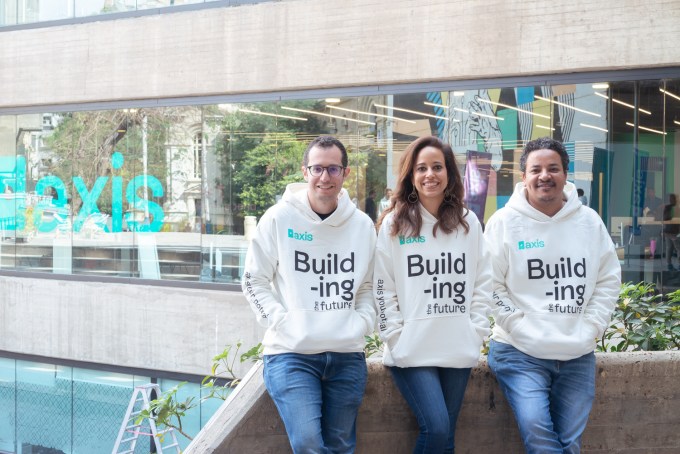Egyptian fintech Axis has launched its digital payments platform to the North African market after securing a license from the apex bank, Central Bank of Egypt (CBE), for its open-loop mobile wallet, axisPay, which offers a digital banking alternative for small businesses and their employees.
This is coming almost 18 months after the startup received an $8.25 million seed investment co-led by Tiger Global, Sawari Ventures and Raba, with participation from Firstminute Capital and RaliCap; founders of Venmo, Rho Banking and Cred; and executives from Revolut and Plaid.
Axis has been in stealth, engaging regulators and getting the necessary licensing for operations, co-founder and CEO Jacques Marco told TechCrunch in a recent interview. “We’ve been focused over the past two years on three tracks: one, licensing (mobile money/wallet issuing and acceptance licenses); two, being deliberate and focused on building the right relationships with the regulator and the local banks, making sure we’re fully licensed and regulated; three, building the whole stack, setting all our integrations end-to-end and passing a certification with the local switch,” the chief executive commented.
Before Axis, Marco co-founded Raseedy, Egypt’s first independent mobile wallet. He exited in 2020 to unicorn startup MNT-Halanwhere he held several roles in strategic finance and digital transformation before leaving in early 2021. Like Marco, Axis’s co-founders Ahmed Ragab and Nada Abdelnour have fintech backgrounds. Ragab, the startup’s chief technology officer, worked as VP of Engineering at Raseedy and was an engineering consultant at IBM Egypt before that. Chief growth officer Abdelnour held several product roles at PayPal subsidiary ZettleYahoo and African fintech Yoco.
Small businesses drive most African economies; in Egypt, there are 8 million SMEs and they contribute to 80% of the nation’s $400 billion+ GDP and employ over 20 million people. These small businesses are heavily cash-based, with little access to online banking services, payroll processing and working capital financing. Over 60% of them still pay employee salaries in cash, and suppliers in cash or cheque, which has flaws from fraud to financial exclusion.
Despite the glaring need to digitize small businesses’ payments and money flow, the bulk of fintech in Egypt, with solutions from MoneyFellows, On the wire, Sympl and others, centered on the consumers’ financial inclusion. “No one is servicing SMEs when it comes to banking in general,” said Marco on the play Axis is making in Egypt’s fintech market.
According to the chief executive, small businesses waste an estimated 192 hours per year paying their employees in cash, from sourcing to paying employees. Meanwhile, setting up bank accounts to streamline payroll is somewhat cumbersome and expensive for these businesses. They are also usually burdened by manually keeping track of salary advance requests and lending their employees money at the expense of cash flow.
For employees, most of whom are part of Egypt’s financially excluded (about 65% of the adult population), Marco asserts that carrying cash is a hassle and potentially unsafe; paying for things in cash means paying for them in person as opposed to the convenience of paying for things digitally.
Axis’ platform provides an alternative for these businesses, he says. It helps streamline their payments to employees and suppliers via axisPay mobile wallets. They can send salaries, reimburse expenses, carry out expense management, earn cashback and offer earned wage advances to their employees on their wallets, in turn enabling employees to access a range of financial services: funds transfer, bill payment and online shopping and QR code payments.
Fintechs such as Khazna and NowPay offer earned wage access (EWA) services in Egypt, presenting some form of competition to Axis, a later entrant. However, Axis founders argue that their EWA differs in that it focuses on small businesses and unbanked/underbanked employees, distinguishable from the other players that target enterprises with mostly banked employees.
“Think of us like an M-Pesa for small businesses in Egypt. We help these small businesses that are heavily cash reliant and pay their employees, suppliers and B2B payments in cash and provide digital payments alternative for them. We’re also solving a consumer pain point and tackling financial inclusion both ways,” said Abdelnour on the call.
“In the future, consumers will be able to receive remittances from abroad to their mobile wallet and we’re partnering with a few remittance players abroad to be able to enable that.” The startup partnered with Visa for its mobile wallet and virtual card and with Fawry to enable customers to cash in and out from the Egyptian fintech giant’s network of 250,000 agents across MENA’s most populous country.

Axis founders (from left to right): Jacques Marco, Nada Abdelnour and Ahmed Ragab
Axis has now beta launched its platform to over 100 small businesses (in various industries such as food and beverages, retail, tourism, construction and healthcare) and the 5,000 employees it onboarded while in stealth. Marco said Axis is projecting to close the year with 5,000 small businesses and 80,000-100,000 employees as the “well-capitalized” fintech continues to iterate and improve its offerings, including a lending product that taps into a $15 billion SME financing gap in Egypt.
“We want to position ourselves in a way that makes our solution a lot more sticky and costly to switch from. If you’re doing payroll with us, running B2B payments, we also want you to take working capital from our platform,” Marco said about the lending product Axis intends to launch by year’s end. “All this we’re doing closely with the regulator to follow the country’s national strategy of digitization, reducing cash, empowering small businesses and growing the economy.”
Note: This article have been indexed to our site. We do not claim legitimacy, ownership or copyright of any of the content above. To see the article at original source Click Here













